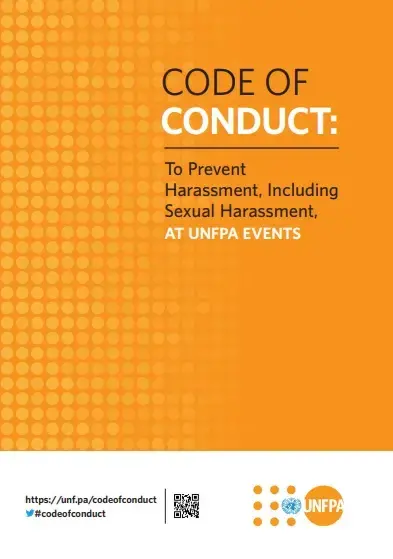PURPOSE
UNFPA is committed to enabling events at which everyone can participate in an inclusive, respectful and safe environment. UNFPA events are guided by the highest ethical and professional standards, and all participants are expected to behave with integrity and respect towards all participants attending or involved with any UNFPA event.
APPLICABILITY
The Code of Conduct applies to any UNFPA event, which shall include meetings, conferences and symposia, assemblies, receptions, scientific and technical events, expert meetings, workshops, exhibits, side events and any other forum organized, hosted or sponsored in whole or part by UNFPA wherever it takes place, and any event or gathering that takes place on UNFPA premises whether or not UNFPA is organizing, hosting or sponsoring. The Code of Conduct applies to all participants at a UNFPA event, including all persons attending or involved in any capacity in a UNFPA event. Any other entity responsible for a UNFPA event commits to implementing the Code of Conduct. The Code of Conduct is not legal or prescriptive in nature. It supplements, and does not affect, the application of other relevant policies, regulations, rules and laws, including laws regulating the premises in which the UNFPA event takes place and any applicable host country agreements.
PROHIBITED CONDUCT
Harassment is any improper or unwelcome conduct that might reasonably be expected or be perceived to cause offense or humiliation to another person. Harassment in any form because of gender, gender identity and expression, sexual orientation, physical ability, physical appearance, ethnicity, race, national origin, political affiliation, age, religion or any other reason is prohibited at UNFPA events. Sexual harassment is a specific type of prohibited conduct. Sexual harassment is any unwelcome conduct of a sexual nature that might reasonably be expected or be perceived to cause offense or humiliation. Sexual harassment may involve any conduct of a verbal, nonverbal or physical nature, including written and electronic communications, and may occur between persons of the same or different genders. Harassment and sexual harassment are particularly serious when committed against children (persons under the age of 18) or other individuals in a position of vulnerability. Examples of sexual harassment include, but are not limited to:
• Making derogatory or demeaning comments about someone’s sexual orientation or gender identity
• Name-calling or using slurs with a gender/sexual connotation
• Making sexual comments about appearance, clothing or body parts
• Rating a person’s sexuality
• Repeatedly asking a person for dates or asking for sex
• Staring in a sexually suggestive manner
• Unwelcome touching, including pinching, patting, rubbing or purposefully brushing up against a person
• Making inappropriate sexual gestures, such as pelvic thrusts
• Sharing sexual or lewd anecdotes or jokes
• Sending sexually suggestive communications in any format
• Sharing or displaying sexually inappropriate images or videos in any format
• Attempted or actual sexual assault, including rape
COMPLAINT PROCESS
A participant who feels that they have been harassed at a UNFPA event may report the matter to the organizer of the UNFPA event or relevant security authority, and a participant who witnesses such harassment should make such a report. Such reporting shall have no effect on any applicable rules and procedures that may apply in UNFPA or to other personnel. The organizer of the UNFPA event will be expected to take appropriate action in accordance with its applicable policies, regulations and rules. Examples of appropriate action may include, but are not limited to:
• Requesting the perpetrator to immediately stop the offending behavior
• Suspending or terminating the perpetrator’s access to the UNFPA event or refusing registration at future UNFPA events, or both
• Conveying the complaint to any investigative or disciplinary authority with jurisdiction over the person accused of harassment
• Conveying a report to the employer or entity with jurisdiction over the person accused of harassment for appropriate follow-up action The victim of alleged harassment may also seek help from other relevant authorities, such as the police, bearing in mind the applicable legal framework. A participant should never knowingly make a false or misleading claim about prohibited conduct.
PROHIBITION OF RETALIATION
Threats, intimidation or any other form of retaliation against a participant who has made a complaint or provided information in support of a complaint are prohibited. UNFPA or other entity responsible for a UNFPA event will take any reasonable appropriate action needed to prevent and respond to retaliation, in accordance with its applicable policy, regulations and rules.


